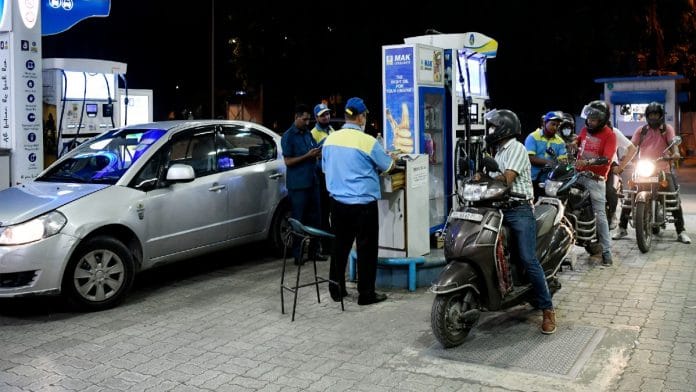New Delhi: Announcing a series of steps to curb inflation, the Narendra Modi government Saturday reduced the excise duty on petrol and diesel by Rs 8 and Rs 6 per litre respectively.
It has also decided to enhance the fertiliser subsidy for farmers, and offer a Rs 200 subsidy on cooking gas to over nine crore beneficiaries of the Pradhan Mantri Ujjwala Yojana.
The move comes at a time when the country is reeling under record-breaking inflation. India’s annual inflation rate, based on the Consumer Price Index (CPI), rose to an 8-year high of 7.79 per cent in April. Meanwhile, inflation based on wholesale prices rose to 15.08 per cent, the highest in at least 9 years, in the same month.
Finance Minister Nirmala Sitharaman announced the decisions on Twitter Saturday, adding that excise duty cut on fuels “will reduce the price of petrol by Rs 9.5 per litre and of diesel by Rs 7 per litre”.
7/12 We are reducing the Central excise duty on Petrol by ₹ 8 per litre and on Diesel by ₹ 6 per litre.
This will reduce the price of petrol by ₹ 9.5 per litre and of Diesel by ₹ 7 per litre.
It will have revenue implication of around ₹ 1 lakh crore/year for the government.
— Nirmala Sitharaman (@nsitharaman) May 21, 2022
According to her tweets, excise duty cut on petrol and diesel will have revenue implications of around Rs 1 lakh crore a year on the government.
Sharing Sitharaman’s tweet, Prime Minister Narendra Modi wrote on Twitter: “It is always people first for us! Today’s decisions, especially the one relating to a significant drop in petrol and diesel prices will positively impact various sectors, provide relief to our citizens and further ‘Ease of Living’.”
It is always people first for us!
Today’s decisions, especially the one relating to a significant drop in petrol and diesel prices will positively impact various sectors, provide relief to our citizens and further ‘Ease of Living.’ https://t.co/n0y5kiiJOh
— Narendra Modi (@narendramodi) May 21, 2022
Before the announcement, the price of petrol was Rs 105.41 per litre and that of diesel was Rs 96.67 per litre in the national capital. In Mumbai, petrol was priced at Rs 120.51 per litre while diesel cost 104.77 per litre.
While the government had slashed excise duty on both auto fuels last November, the prices were still very high. After Saturday’s cut, excise duty on petrol will stand at Rs 19.90 per litre and at Rs 15.80 per litre on diesel.
Sitharaman also urged state governments to reduce the Value Added Tax (VAT) on both auto fuels: “I wish to exhort all state governments, especially the states where reduction wasn’t done during the last round (November 2021), to also implement a similar cut and give relief to the common man.”
Last month, Chief Economic Adviser V. Anantha Nageswaran had said that if the price of global crude persists above $100 a barrel for one or two quarters, the government will have to take action on fuel excise duty, and the government and oil marketing companies will have to share the burden.
The decision to cut excise duty was also one of the demands of the Reserve Bank of India (RBI), which had, in a surprise move earlier this month, hiked the key policy rate — repurchase or rep rate — by 40 basis points to 4.40 per cent in order to arrest the sharp surge in inflation. Repo rate is the rate at which commercial banks borrow from the RBI.
Aditi Nayar, Chief Economist at ICRA Ltd., an independent and professional investment information and credit rating agency, told ThePrint that the “welcome reduction in excise duty will help cool the inflation trajectory going ahead, and complement monetary policy”.
“We project the May 2022 CPI inflation at 6.5-7.0 per cent. The fiscal cost, while material, can be absorbed by higher than budgeted revenues through other taxes. We now estimate the tax revenues of the Government of India to surpass the budget estimates by at least Rs 1.3 trillion (Rs 1.3 lakh crore) even after the excise reduction,” she added.
Also Read: As inflation breaks records, Modi govt plans to counter criticism ahead of anniversary & polls
Fertiliser, LPG subsidies, reduced import duty on raw materials
To “protect” farmers amid a global rise in fertiliser prices, Sitharaman said the government will enhance fertiliser subsidy by an additional Rs 1.10 lakh crore to make it Rs 2.15 lakh crore.
5/12 Despite rising fertilizer prices globally, we have protected our farmers from such price hikes. In addition to the fertilizer subsidy of ₹ 1.05 lakh crore in the budget, an additional amount of ₹ 1.10 lakh crore is being provided to further cushion our farmers.
— Nirmala Sitharaman (@nsitharaman) May 21, 2022
According to the World Bank blogs, fertiliser prices have risen by around 30 per cent since the start of 2022, following last year’s surge of 80 per cent.
“Soaring prices are driven by a confluence of factors, including surging input costs, supply disruptions caused by sanctions (Belarus and Russia), and export restrictions (China),” the website said.
Sitharaman said the government has also decided to give a subsidy of Rs 200 per gas cylinder, up to 12 cylinders, to beneficiaries of the Pradhan Mantri Ujjwala Yojana. This will cost the government an additional Rs 6,100 crore, she added.
Apart from this, the government will also reduce customs duty on raw materials and intermediaries for plastic goods where India’s dependence is high.
“Import duty on some raw materials of steel will be reduced. Export duty on some steel products will be levied,” Sitharaman said.
(Edited by Gitanjali Das)
Also Read: Inflation raised monthly expenses of 92% Indian families in last 3 months, finds online survey






